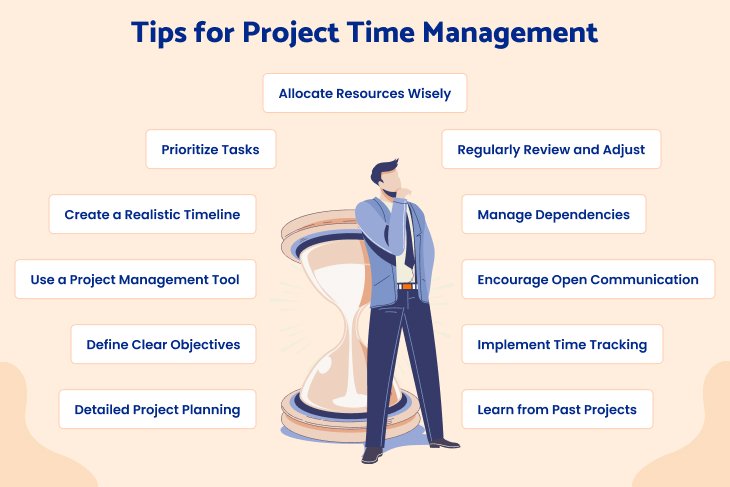Importance of project time management
- Efficient time management ensures that project tasks are completed within the specified deadlines. Meeting deadlines is crucial for delivering the project on time and maintaining the trust and satisfaction of stakeholders.
- Time is directly linked to costs in project management. Delays in project completion often result in increased costs, including additional labor expenses and extended resource usage.
- Proper time management helps in allocating resources efficiently. By understanding the time requirements for each task, project managers can assign resources appropriately.
- Well-managed time promotes better organization and coordination among team members.
- Timely project delivery contributes to stakeholder satisfaction. Whether stakeholders are internal or external, meeting deadlines builds trust and confidence.
- Effective time management allows for flexibility in adapting to changes in project scope or requirements. A well-organized project schedule makes it easier to assess the impact of changes and adjust the timeline accordingly.
Tips for project time management

Detailed Project Planning:
Start with a thorough project plan that outlines all tasks, deliverables, and milestones. Break down the project into smaller, manageable phases. This plan serves as a roadmap, providing a clear overview of the project’s scope and timeline.
Define Clear Objectives:
Clearly define project objectives and deliverables. Understanding the goals of the project helps in prioritizing tasks and allocating time efficiently. Ensure that all team members have a shared understanding of the project’s purpose and desired outcomes.
Use a Project Management Tool:
Implement a project management tool to facilitate planning, collaboration, and tracking. Tools like Asana, Trello, or Microsoft Project can help organize tasks, set deadlines, and keep everyone on the same page.
Create a Realistic Timeline:
Set realistic and achievable deadlines for each task and milestone. Consider factors such as resource availability, dependencies between tasks, and potential risks. A well-planned timeline provides a framework for the project’s progression.
Prioritize Tasks:
Identify critical tasks that directly impact project success. Prioritize these tasks to ensure they receive the necessary attention and resources. This helps in avoiding bottlenecks and ensures that the most crucial elements are addressed first.
Allocate Resources Wisely:
Understand the skill sets and availability of your team members. Allocate resources based on individual strengths and workload capacity. Efficient resource allocation prevents burnout and maximizes productivity.
Regularly Review and Adjust:
Periodically review the project plan and timeline. Assess progress, identify potential delays, and make adjustments as needed. A flexible approach allows for adaptation to unforeseen challenges or changes in project requirements.
Manage Dependencies:
Identify task dependencies and manage them effectively. A delay in one task can have a domino effect on subsequent tasks. Clearly communicate dependencies to team members and stakeholders to avoid disruptions.
Encourage Open Communication:
Foster a culture of open communication within the team. Encourage team members to communicate progress, challenges, and concerns. This transparency allows for timely problem-solving and prevents issues from escalating.
Implement Time Tracking:
Use time-tracking tools to monitor the time spent on tasks. This data provides valuable insights into individual and team efficiency. It also helps in identifying areas where adjustments can be made to improve overall time management.
Learn from Past Projects:
Reflect on past projects to identify lessons learned. Understand what worked well and what didn’t in terms of time management. Use this knowledge to continuously improve your project management processes.
Conclusion
By implementing the tips mentioned above, you can enhance your project time management capabilities, increase the likelihood of meeting project deadlines, and deliver successful outcomes. Keep in mind that effective time management is an ongoing process that requires regular evaluation and adjustment as the project progresses.

